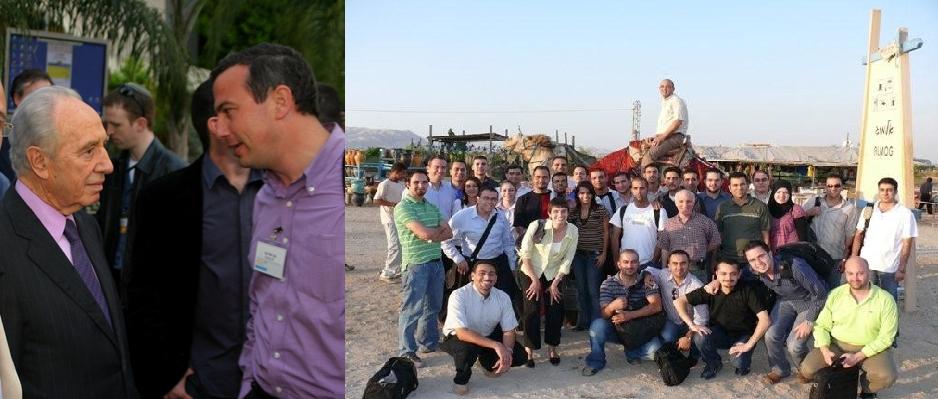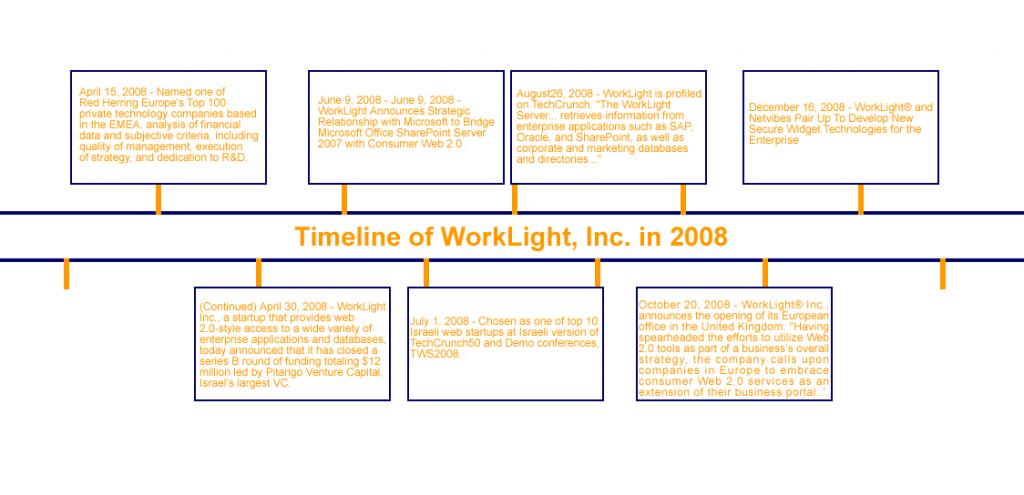 TechAviv, a global group for hi-tech Israeli entrepreneurs, had its first meeting of 2009 at the Inter-Disciplinary College (IDC) in Herzilyya last night. During the event, which was only open to Israeli entrepreneurs, representatives from Outbrain, 2Pad and Boxee spoke about their companies. The event was streamed live over the Internet on the TechAviv website. Watching part of the event online, the most interesting thing for me was noticing that out of all who attended the event, there was not one woman in the audience.
TechAviv, a global group for hi-tech Israeli entrepreneurs, had its first meeting of 2009 at the Inter-Disciplinary College (IDC) in Herzilyya last night. During the event, which was only open to Israeli entrepreneurs, representatives from Outbrain, 2Pad and Boxee spoke about their companies. The event was streamed live over the Internet on the TechAviv website. Watching part of the event online, the most interesting thing for me was noticing that out of all who attended the event, there was not one woman in the audience.
Sadly, this isn’t very surprising. Of the hundreds of Israeli companies that I have become familiar with in the past year and a half, the only company that I can think of that was started by a woman is eSnips (founded by Yael Elish and her then-husband). This isn’t just in Israel though and it’s not limited to just women starting companies in technology.
I started planning this entry back in November after Charlene Li, the former Forrester Senior Analyst, posted on her blog about the shortage of women speakers at technology industry events. (In it she mentioned that though there are few women in tech to begin with, there are fewer women who can make the time commitments required for conferences due to familial responsibility.)
My intention at the time was to answer the questions, “Where are the women?” “Why aren’t women in hi-tech?” and “Are women less innovative than men?” Questions that were also brought up today on Twitter in an interesting discussion between @TechAviv (Yaron Samid), @OurielOhayon, @israluv (Ahuvah Berger) and others about the lack of female entrepreneurs in Israel in relation to last night’s event.
The following are a few ideas based on what I found when I did preliminary research a few months ago on these topics.
Regarding the last question first, statistically it would certainly appear that men are more innovative than women. Go to any conference (in the United States) on technology and there will be few women speakers and only a few more in the audience. The biggest female entrepreneur in tech that comes to my mind is Arianna Huffington of the Huffington Post, while when I think of men, several come to mind (Steve Jobs for example). In Israel, though Yael Elish is the only female tech entrepreneur I can think of, two of the biggest bloggers/consultants I can think of in the Web 2.0 space, are female: Ayelet Noff of Blonde 2.0 and Orli Yakuel of Go2Web2.

Steve Jobs
In an online search I conducted on major scientific breakthroughs of the past 200 years that were made by women, About.com seemed to have the best list that was solely of female inventors. It includes:
- Randice-Lisa Altschul (invented the world’s first disposable cell phone)
- Mary Anderson (invented the windshield wiper)
- Marie Curie (discovered radium and furthered x-ray technology)
- Ada Lovelace (wrote a scientific paper in 1843 that anticipated the development of computer software artificial intelligence and computer music)
- Krisztina Holly (Co-invented the telephony software called Visual Voice)
- and Bette Nesmith Graham (invented liquid paper, also known as White-Out™).
In addition, the CS (computer science) department at Yale University has a list of women who contributed to CS that includes:
- Alexandra Illmer Forsythe (During the 1960’s and 1970’s, she co-authored a series of textbooks on computer science, published by Wiley & Sons and Academic Press, including the first textbook written in CS.)
- Erna Schneider Hoover (She invented a computerized switching system for telephone traffic, to replace existing hard-wired, mechanical switching equipment. For this ground-breaking achievement — the principles of which are still used today — she was awarded one of the first software patents ever issued in 1971 ).
From these lists, it is clear that women too have invented things throughout the past 200 years, but not in significant numbers and none at the level of fame or being as prolific as men such as Thomas Edison, Eli Whitney or Henry Ford.

Ford Model T
Since the 1990s, psychologists have conducted several research studies on what the reasons are for why there are fewer female innovators than male ones.
One reason psychologists have found is that women perform lower in math when conscious of gender stereotypes and get turned off that way. Another study explains that young women tend to avoid careers in math, science and engineering “because they view science as a solitary rather than a social occupation” and uninteresting. Instead many are in public relations, education and psychology. The main theory that has been presented in recent years is based on the amount of confidence given by parents and teachers in these areas- “the self-confidence instilled by parents and teachers is more important for young girls learning math and science than their initial interest.”
Now that there is proof that males and females have equal cognitive abilities for math, incentives and programs are more actively being put in place to change female perceptions and stimulate more interest among them in math and science. Through these there should be changes seen in the near future of a new generation of new generation female inventors/entrepreneurs.
Regarding what can be done in Israel, going back to the TechAviv and the Twitter discussion, Yaron Samid suggested that Israeli entrepreneurs start an Israeli female entrepreneur group. I think going beyond that group, a national program or wider organization should be created that nurtures women’s interest in science from at least high school age and provides resources to them and older women.
What do you think should be done in Israel?
Update: January 11, 2009 – Joel Katz has notified me that in a video taken by Oren Todoros of SeoVice at TechAviv last week, there are at least two women. You can view the video on seovice.com.

 Israel-based
Israel-based 

 In the past 5 years, Israel has experienced a revival in cleantech initiatives that is slowly leading it to become the top country in the field, regarding both innovating and practicing it. In 2008, a total of
In the past 5 years, Israel has experienced a revival in cleantech initiatives that is slowly leading it to become the top country in the field, regarding both innovating and practicing it. In 2008, a total of  As if reading the news the past few months hasn’t been depressing enough with the worldwide economic downturn, the current conflict going on in Gaza had to happen to bring the news down to a whole new level of sadness. With each passing day it seems less likely that there will ever be a real peace between Israelis and Palestinians, and yet, as the current conflict unravels, one company, with an office in the Israeli city of Modi’in and another in the West Bank city of Ramallah seems to have found a solution.
As if reading the news the past few months hasn’t been depressing enough with the worldwide economic downturn, the current conflict going on in Gaza had to happen to bring the news down to a whole new level of sadness. With each passing day it seems less likely that there will ever be a real peace between Israelis and Palestinians, and yet, as the current conflict unravels, one company, with an office in the Israeli city of Modi’in and another in the West Bank city of Ramallah seems to have found a solution.
 TechAviv
TechAviv

 I meant to write about WorkLight last month but got caught up with things. As what happens
I meant to write about WorkLight last month but got caught up with things. As what happens 
